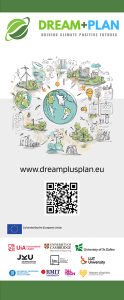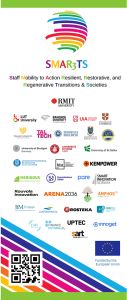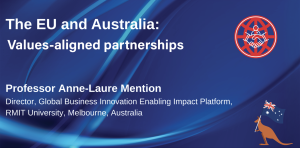As a prominent Australian senior researcher with an excellent international reputation and a strong track record in major EU projects, what do you think about the potential partnership between Australia and Horizon Europe?
Australia must move forward with its partnership with Horizon Europe. This is not just optional. As Australia reaches a pivotal moment in its transition to a more diverse, low-carbon, high-performance economy, building resilience and adaptability must be top of mind. Unlocking cooperation across sectors and borders is key, and in particular deepening our strategic relationship with Europe through Horizon Europe (the European Union’s main funding program for research and innovation) and future programs, which offer strong pathways to shared innovation, sustainable growth and long-term prosperity.
What do you think the main benefits of an association agreement with Horizon Europe will be for Australia?
Joining Horizon Europe through the Association Agreement provides Australia with a valuable opportunity to expand its global research impact through participation in one of the world’s largest research and innovation funding programs, paving the way for Australian researchers, institutions, businesses and other organizations to participate in the Horizon Europe program on an equal footing with their EU counterparts.
The benefits are strategic and tangible. New Zealand authorities have publicly reported that a modest investment of $5 million has made $116 million in Horizon Europe funding available to researchers. This is an amazing leverage effect that emphasizes the scale and scope of the program.
Given the changing global situation, forging deeper relationships with partners like the European Union who share our values and long-term vision is not only strategic, but also timely and urgent.
Beyond funding, Horizon Europe opens the door to lasting partnerships, connecting Australia to a vibrant global network that unites leading scientists, advanced technology and industry leaders to tackle critical and complex challenges together.
The program’s structure fosters deep engagement with industry, NGOs and innovation hubs, creating strong network multiplier effects and global connections.
Importantly, Horizon Europe will also open up new avenues for science diplomacy and evidence-based policy-making, enabling Australia to engage with partners with aligned values in an increasingly complex geopolitical landscape. Strong European R&D investment and internationalization efforts enable Australia to strengthen its research and innovation ecosystem, expand global partnerships and provide richer cross-cultural experiences for students and researchers through joint programs and shared research agendas.
Given your experience as principal investigator and academic leader on four large-scale Horizon Europe projects, what do you think are the most tangible benefits for Australia of pursuing a coalition agreement?
Without a doubt, we can confidently say that the return on investment is huge.
To fully realize the transformative potential of Horizon Europe and similar initiatives, institutions must invest in the capacity to enable meaningful participation.
Let me give you some background. Since joining RMIT in 2017, I have secured my first RMIT-coordinated EU project, OpenInnoTrain (Research and Innovation Mobility Project), followed by three further large-scale RMIT-coordinated ones: (EINST4INE – European Training Network for Industrial Digital Transformation across Innovation Ecosystems, Driving Climate Positive Futures (also known as DREAM+PLAN)), a joint fund that has recruited 35 PhD candidates. All of our European partner universities are undertaking secondments of up to 12 months to RMIT University in Melbourne, Australia, with most also undertaking dual degrees with both universities and the research and innovation mobility project SMAR3TS (Staff Mobility to Action Resilient, Restorative, & Regenerative Transitions & Societies).


These four projects have received a total of EUR 12.4 million in European funding and evaluation. For example, OpenInnoTrain was recognized as one of the European Year of Skills 130 projects and won the Australian Business Deans Council Award (2024) for innovation and excellence in international engagement.
Through these projects, collaborative research and training agreements were established with nine AACSB accredited universities, and partnerships (i.e., partners in these projects) were built with 65 companies and more than 30 academic institutions.
To fully realize the transformative potential of Horizon Europe and similar initiatives, institutions must invest in the capacity to enable meaningful participation. This means ensuring that projects are not only aligned with strategic priorities, but also designed and led by principal investigators with deep research expertise grounded in academic leadership and organizational engagement. Importantly, success will depend on strong resources in both Europe and Australia. Without the dedicated support of both parties, even the most promising collaborations risk falling short of their potential impact.
Which pillars within Horizon Europe do you think Australia should focus on when establishing an association?
Most countries start their Horizon Europe associations by focusing on the second pillar: Global Challenges and European Industrial Competitiveness, but by limiting their involvement to a single pillar they risk missing out on all the opportunities the program offers. Broader collaboration across all three pillars will enable Australia to build long-term research capacity, foster innovation and expand global impact. In my opinion, the recent association agreement between Switzerland and Horizon Europe (spanning all three pillars) serves as an exemplary model.

Pillar 1 – Excellent Science – is the basis for capacity building and enables participation in large-scale transcontinental research infrastructures and talent pipelines, including industry-involved PhD and postdoctoral programs. Meanwhile, alignment with Pillar 3 – Innovative Europe – provides direct access to the European Innovation Council (EIC), a powerful mechanism for scaling up breakthrough technologies. Leveraging this pillar has the potential to foster research translation and commercialization on a truly global scale, especially in synergy with national initiatives.
Horizon Europe will also open up new avenues for science diplomacy, enabling Australia to engage with partners with aligned values in an increasingly complex geopolitical landscape.
What do you think are the risks of Australia not getting involved in Horizon Europe?
Australia’s failure to join Horizon Europe would risk strategic isolation at a time when global cooperation is essential to solving grand societal challenges. It would mark a departure from one of the world’s largest and most dynamic research ecosystems and undermine our visibility, credibility and competitiveness in the international R&D&I environment. Such a move would not only reduce opportunities for Australian researchers, but could also weaken our country’s ability to attract and retain the world’s best talent. In an era defined by interconnected challenges and innovation-driven growth, turning inward is not a viable strategy.
This article will also be published in the quarterly magazine issue 24.
Source link


